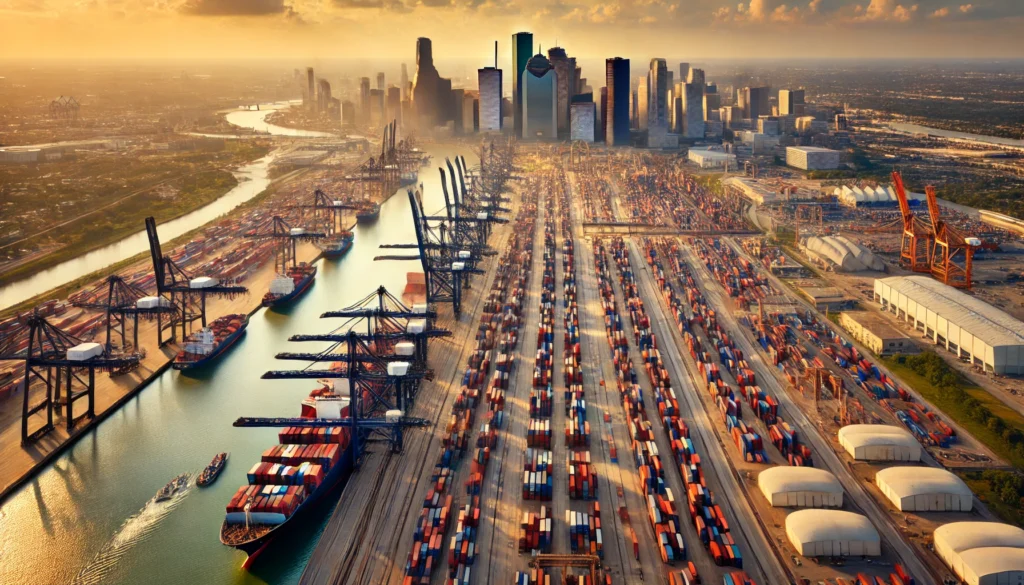Houston’s transformation into a major hub for international trade and commerce is a story of strategic development, natural advantages, and visionary leadership. From its early days as a modest trading post to becoming a global economic powerhouse, Houston’s journey is both fascinating and instructive.

Early Foundations: Geography and Beginnings
In the 19th century, Houston was a small settlement with big ambitions. Its location near the Gulf of Mexico provided access to international waters, making it a natural point for trade. The city’s founders recognized this potential and began developing infrastructure to support commerce.
- Key Early Developments:
- Establishment of rail connections to other U.S. cities
- Growth of local agriculture and timber industries
- Expansion of small-scale trading hubs along Buffalo Bayou
The Houston Ship Channel: A Game Changer
One of the most significant milestones in Houston’s history was the opening of the Houston Ship Channel in 1914. This man-made waterway transformed the city into a significant inland port, allowing large vessels to transport goods directly to and from the city. The channel’s creation was instrumental in establishing Houston as a hub for the petroleum and shipping industries, driving substantial economic growth.
- Impact of the Ship Channel:
- Enabled direct access to global markets
- Boosted the local economy by attracting businesses
- Positioned Houston as a key energy trade center
Interesting Fact: The Houston Ship Channel is one of the busiest ports in the United States, handling more than 247 million tons of cargo annually.
The Rise of the Energy Sector
Houston’s proximity to oil reserves positioned it as a central player in the energy sector. The discovery of oil in Texas in the early 20th century led to an economic boom, with numerous energy companies setting up operations in the city. This influx solidified Houston’s reputation as the “Energy Capital of the World”, attracting businesses and talent from around the globe.
- Key Developments in Energy Trade:
- Growth of oil refineries and petrochemical plants
- Emergence of energy trading markets
- Expansion of Houston’s role in natural gas and renewable energy sectors
Interesting Fact: Houston is home to more than 4,600 energy-related companies, making it the largest concentration of energy businesses in the world.
Port of Houston: A Modern Marvel
Today, the Port of Houston stands as a testament to the city’s trade prowess. It ranks as the largest Gulf Coast container port, handling 73% of U.S. Gulf Coast container traffic. Its strategic location and state-of-the-art facilities make it a critical node in global trade networks.
- Why the Port of Houston is Important:
- Facilitates trade with over 200 countries
- Generates more than $800 billion in economic impact
- Supports over 1.3 million jobs nationwide
Interesting Fact: The Port of Houston ranks fifth in the U.S. for total cargo volume and is one of the fastest-growing container ports in North America.
Diversification and Innovation
While energy remains central to Houston’s economy, the city has diversified into other sectors such as healthcare, aerospace, manufacturing, and technology. This diversification has bolstered its international trade relationships, with over 5,000 Houston companies engaged in global business and approximately 1,000 firms reporting foreign ownership.
- New Sectors Fueling Houston’s Economy:
- Medical and Biotech Trade: Houston is home to the Texas Medical Center, the largest in the world.
- Aerospace and Defense: NASA’s Johnson Space Center strengthens Houston’s international partnerships in space research.
- Technology and Innovation: Growth of tech startups and investment in AI and robotics.
Infrastructure and Connectivity
Houston’s development of robust infrastructure has been key to its trade success. The city boasts two major international airports and extensive rail and road networks, facilitating efficient movement of goods and people.
- Key Infrastructure Elements:
- George Bush Intercontinental Airport: One of the busiest cargo airports in the U.S.
- Rail Network: Links Houston to major North American markets
- Highway System: Connects Houston to key trade routes across the U.S. and Mexico
Interesting Fact: Houston’s airport system contributes over $27 billion to the local economy annually.
Houston: A Global City
Houston’s evolution into a global city is marked by its diverse population, international partnerships, and cultural richness. The city is home to over 145 different languages spoken, making it one of the most multicultural cities in the United States.
- Why Houston is a Global Trade Leader:
- Ranked among the top 10 U.S. metro areas for exports
- Hosts numerous international trade missions and summits
- Strong business ties with Asia, Europe, and Latin America
Houston’s Future in Global Trade
Houston’s ascent as a hub for international trade is the result of strategic infrastructure development, a strong energy sector, diversification, and a commitment to global engagement. The city’s continued focus on innovation and expansion will ensure its position as a global economic leader for years to come.